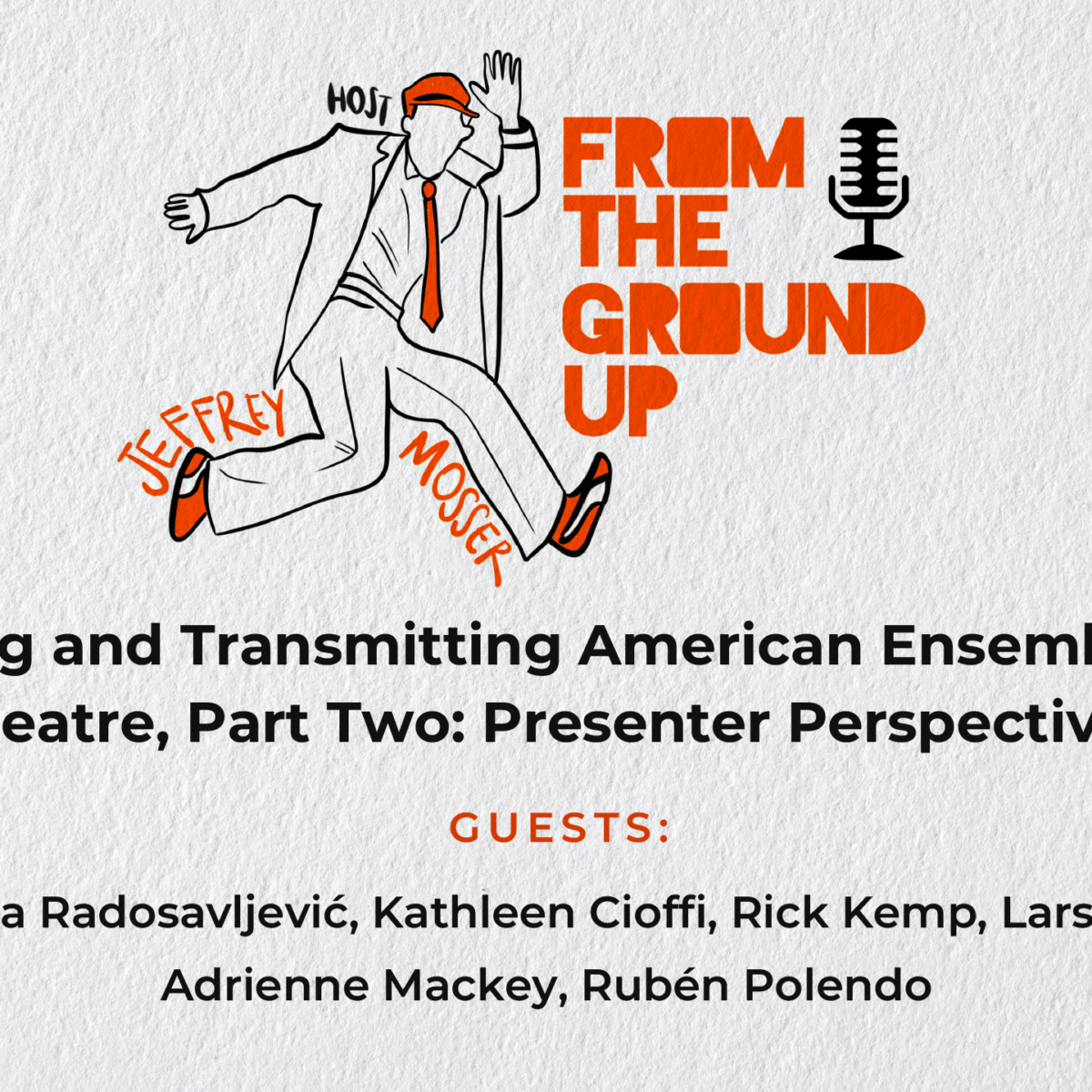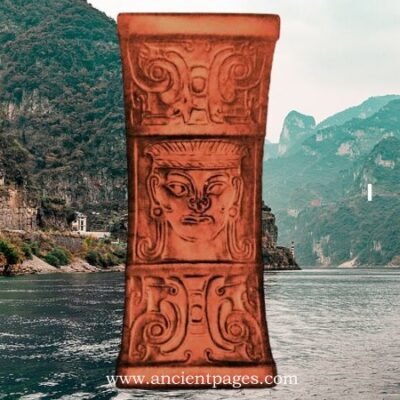Jeffrey Mosser: Welcome to another episode of the From the Ground Up Podcast, produced for HowlRound Theatre Commons, a free and open platform for theatremakers worldwide. I’m your host, Jeffrey Mosser, recording from the ancestral homeland of the Potawatomi, Ho-Chunk, and Menominee, now known as Milwaukee, Wisconsin. These episodes are shared digitally to the internet. Let’s take a moment to consider the legacy of colonization embedded within the technology, structure, and ways of thinking that we use every day. We are using equipment and high-speed internet not available in many Indigenous communities. Even the technologies that are central to much of the work we make leaves a significant carbon footprint contributing to climate change that disproportionately affects Indigenous people worldwide.
I invite you to join me in acknowledging the truth and violence perpetrated in the name of this country as well as our shared responsibility to make good of this time and for each of us to consider our roles in reconciliation, decolonization, and allyship.
Dear artists, so glad to have you back for this second episode in a three-part series dedicated to the National Endowment for the Humanities Institute on Preserving and Transmitting American Ensemble-Based Devised Theatre at Pig Iron Theatre Company in Philadelphia. If you joined us for episode one of the season, you know that we made some really exciting connections with the participants of this program. And now today, our goal is to connect you to some of the presenters within this program and why they felt it was important for them to present at this historic institute.
Now, let me take this moment to say if this happens to be your first episode of From the Ground Up, welcome. So you don’t miss the exciting conclusion of this three-part series, I’m going to encourage you and everyone else to go ahead and subscribe, follow, like From the Ground Up on your preferred podcasting platform. And to everyone, please do review and rate this and other episodes which helps other fans of ensemble-based and collectively creative works find us out there.
All right, seriously off the cuff, off script right now, I have like seven reviews on Spotify. And I know y’all are out there. People tell me you listen. You’re listening, right? Right? Anyway, please jump out there. Go ahead, review, rate. Much appreciated, y’all. Seriously. All right. This episode takes a pretty deep dive into the expertise of each guest’s work, and I’m going to encourage you to Google the heck out these people: Duška Radosavljević, Kathleen Cioffi, Rick Kemp, Lars Jan, Adrienne Mackey, and Rubén Polendo. Or at the very least, jump onto the transcript of this podcast at howlround.com and click hyperlinks of all their names to see some really interesting projects they’re affiliated with.
Listen, y’all, I have to say it, that I’m always looking for new guests on the show and so many new guests come from other listeners and from other guests, so please don’t hesitate to reach to me at [email protected] or hit me up at Facebook or Instagram @ftgu_pod or ensemble_ethnographer. Seriously, thanks for that. Much appreciated. Okay, here we go, into our in-depth coverage of the National Endowment for the Humanities Institute on Preserving and Transmitting American Ensemble-Based Theater. These interviews were recorded between June 13th through the 17th, 2023 on the Lenapehoking Land, now known as Philadelphia, Pennsylvania. Enjoy.
Duška Radosavljević: My name is Duška Radosavljević. I’m here on behalf of the Royal Central School of Speech and Drama in London.
Jeffrey: I’m wondering, you said you’re sort of mourning not being able to be a participant, so what exactly, what do you perceive as your mourning?
Duška: Well, actually the main thing really that I will be missing, let’s kind of put it in a more positive way, is the healthy space that’s been created as part of this project. And what I mean by that is really the absence of the usual disgruntlement you get when you are kind of in your normal higher education environment. The disgruntlement that goes with just the usual constraints of neoliberal capitalism.
Somehow this space doesn’t really seem affected by that. The way in which people are together and the way in which there are conversations, passionate conversations going on about shared interests and curiosity. Curiosity is a term that’s been mentioned a lot by various people.
Jeffrey: I wonder if you think that has to do with the roots of ensemble work?
Duška: That’s a really good question. Yes, we are all here because we are interested in ensemble. Yeah, the natural predilection towards ways of working with the collaborative that are generous, that are open. Yeah, maybe that is something that contributes to the atmosphere as well, that the ensemble being at the basis of it all.
Kathleen Cioffi: My name is Kathleen Cioffi. I work at Princeton University Press, and my pronouns are she/her.
Jeffrey: Thank you so much. Why as an institute like this important to hold at this point in time? Do you have any sense of the grand scheme of ensemble-based work in 2023?
Kathleen: Well, like Allen Kuharski and Quinn, I feel that the story of this theatre, this type of theatre is not told enough. We have Broadway and that kind of theatre and script-based theatre, and not that there’s anything wrong with that. I love a good play with the script too. This kind of theatre is also quite fascinating to me, and I think that we should know more about the companies that create it, the ones that did exist in the past, and the ones that are existing right now.
Jeffrey: How long has Theatre of the Eighth Day been a part of your brain?
Kathleen: Since 1985.
Jeffrey: And what was it in particular about them that attracted you to them?
Kathleen: Well, when I saw that first production in 1985, first of all, the audience was riveted. They were so, so into it. I had never seen an audience before. Plus the physicality, the humorousness of the performances. And then when I got to know them better, their own connection with each other, they actually just like each other so much and that’s why they’ve managed to stay together for such a long time. But it’s basically because of love, in a way. Not necessarily sexual love, but love, just the love for your friends, friendship.
There’s a funny story that I meant to tell that I didn’t tell, but during this period when they were performing in churches, they passed a hat to the congregation. And so they had small bills and they came over to my flat, my apartment with my husband, and we had some food. This was the period when some of them were abroad and the others were in Poland.
And we asked them, “Is there anything we can do for you?” And they said, “Well, as a matter of fact, we have all these small bills. Do you have some large bills that you could change for us?” So, we did. So, we gave them some big bill Polish money and we had for a long time in a room in our apartment, this like shoe box full of small bills that we would reach in when we were going shopping, and it was like our Theatre of the Eighth Day box. So, that’s how they sustained themselves during that particular period. I know, but everything else, I don’t really know.
Jeffrey: A delight.
Rick Kemp: Hello, I’m Rick Kemp. Rick is short for Richard, and when I’m being very fancy, it’s short for Richard J. Kemp. I go by he/him and I work at Indiana University of Pennsylvania where I’m head of Acting and Directing.
Jeffrey: How did you find yourself coming to ensemble and devised work and then extrapolating so much from it for what we’ve learned today?
Rick: Well, my encounter with devised work was in London in the early eighties. So, I was just recently out of an undergraduate program and friends told me about it. And with the naivety of youth, I and other friends created a theatre company. We said, “We’re going to make theatre,” because we’d heard that’s what it was. After a while, I realized I needed a bit of training, so I went to Paris and trained with Philippe Gaulier and Monika Pagneux, which for me was an absolute life-changing experience, which has formed the foundation really for how I understand, do, and experience theatre.
The part of the story about how I got into looking at neuroscience was that I happened to read a book called The Feeling of What Happens by Antonio Damasio, who is a neuroscientist, and I thought, “This is describing what I experience.” In academic language, they call that the phenomenological experience. This is describing my experience, so I read more in that field and then it so happened that I moved here to America and I started doing a PhD program at University of Pittsburgh, and my supervisor was Bruce McConachie, who was one of the pioneers of applying cognitive science to theatre.
And about one and a half semesters into the program, he brought out this big thick book, put it down in front of me and said, “Read that.” I’m always up for a challenge, so I said, “Yes, I will.” And the book was Philosophy in the Flesh by George Lakoff and Mark Johnson, which just, boom, again really connected with what my experience is. And I immediately saw the connections between that and acting and performance. And that’s what prompted my first book, Embodied Acting. And because I do devised theatre, I’ve been looking at ways to bring that knowledge into the area of devised theatre. And that’s more recent in terms of production.
Jeffrey: We’re here at this conference, at this institute. I don’t want to presume anything, but why might you feel that this is an important conference to have at this point in time?
Rick: Oh, my goodness. It is so significant. It is so significant because the problem that Quinn and Allen identified, that there is a lack of clarity in disseminating information about devising. A lack of archiving the work of devising. A written play is already archived because it exists in written form, but devising is the most ephemeral of theatrical forms. So, their identification of that problem and then gathering the people that they have gathered, I think is going to be a landmark, actually, when we look back at it in the history of how we understand devised theatre, how devised theatre gets acknowledged and given its rightful place in the theatrical constellation.
I think so much work is going to come out of meetings that have happened here between people, between the participants, between participants and the people who give presentations like myself, that I see a beautiful, I don’t know, rainbow and waterfall of work arising from this over time and hopefully more collaborations and connections. So yeah, it is so important.
Jeffrey: Thank you so much. Thank you for your time. Thanks for presenting and it is a pleasure to meet you. Thank you.
Rick: Pleasure to meet you. Thank you.
Lars Jan: Lars Jan, he/him and the institute I’m here with, I guess I teach at CalArts and have a performance plus art lab called Early Morning Opera.
Jeffrey: Lars, thank you so much for sharing so much about your body of work. How does devised and ensemble-based work play into what you do as an artist?
Lars: Sure. Yeah. I did a lot of training in physical theatre and puppetry originally and worked with a lot of devising around, especially with actors. And then in my sort of network of collaborators, it’s expanded so that it includes designers and technologists and sometimes scientists or anthropologists. And so all of those people are sort of dramaturges in a way and help create visions for pieces. And we make material together in the process, simultaneously when possible, and then look at it or try to advance it a little bit and then assess it.
And then inevitably out of the devising process, one of my favorite things is people make proposals or come up with ideas or designers propose things or scientists bring up problems or bring up new papers or information, and that changes the course of what we were doing and opens apertures into new intriguing avenues. And then we sort of just chase those and then we do that until we have to premiere the show.
Jeffrey: How did it come to be that you discovered that scientists and people beyond the theatrical or artistic field could be devisers or ensemble folks with you in what you’re endeavoring to do with your art?
Lars: I think research of various kinds has always been something that I’ve just done in my own processes. And since I don’t really work on existing texts, I’m researching ideas, events, phenomena that are fascinating and I’m making connections between them. And so that means that I’m drawing on different kinds of expertise. And then when I do that, like the exchange is, well, people want to know what the hell I’m trying to do with that information and how I’m trying to process that information.
And so for example, with my project, Holocenes, when I was talking to scientists, one of the things that they felt was that they had a communication problem. And that they’ve got all this data, they’ve got all this information, but they don’t know how to convey that information in a way that’s going to impact people viscerally or change behavior. And so they were really curious about how artists deliver information in non-paper format, non-paragraph, non-graph format because people are different learners.
How can people be affected by something that’s really visual or choreographic while it’s still informed by ideas that those scientists are working on, but it might actually get to the audience and create curiosity in the audience? And then once the audience has curiosity, they might then go pursue that information themselves in a format that the scientists may have already assembled.
Jeffrey: You know, this is the first sort of institute of its kind gathering folks to transmit and preserve this sort of work and ensemble based work and devised work. I’m wondering why is this institute important at this moment in time?
Lars: Well, always, I mean, a lot of the things that people have been talking about here today, and I haven’t been here for many days like others have, but you’re learning about so many different kinds of incubators, and those incubators are all parts of essentially fragile ecologies. And it’s almost like it’s against logic that a lot of them ever existed and persisted. And so I feel like this kind of work and artistic expression has always existed outside of a capitalist model and without profound institutional support, without profound philanthropic support.
And so it’s actually ultimately about connecting these communities together that are disparate and sometimes fractured to different degrees in different cities and different countries and re-energizing them with new relationships and connecting them with hopefully new collaborators and new resources and new ideas. And also education about models that may have existed in the past that may be informative now that people otherwise might not learn about because there’s not a great way to learn about this kind of work because it’s so ephemeral.
Jeffrey: Awesome. Thank you so much.
Lars: Yeah, pleasure. Thank you.
Jeffrey: I’m here with Adrienne Mackey, assistant professor of Acting, Directing, and Devising at the University of Washington. And for folks who may not know your body of game work, how does devised and ensemble-based work fit into the game creation and process that you just spent a couple hours talking to us about?
How do we steal that disciplinary knowledge and apply it back to original devised works?
Adrienne Mackey: Yeah. I mean, I began as a devised theatre director, and I had a body of work that was essentially traditional devised work, if you can call it that, where I was doing a lot of site-based work. I was really interested in interaction. And the very first show that my company, Swim Pony, did was this giant installation piece called Survive!, where I’m interested in giving people an experiential sense of the cosmic scale. I really wanted them not to hear scientists talking about it in a play, but actually feel how big things could be.
And so we started building this giant installation and partway through I thought there must be a way to structure this through some organizing principle. And it turned out that a high school friend of mine who had gone to nerdy theatre camp with me was now working for Bethesda, which is a huge game company. So, my friend Shane came into one of our rehearsals and I said, “Can you just give us a primer on game design?” And he gave us a whole bunch of different things that he’d learned in grad school, some of which made it into the show, some of which didn’t, but it suddenly clicked for me, knowing that there was a body of work out there that I had never thought about before for structuring interaction.
And as somebody who was increasingly interested in involving audiences in my work, the idea that there were design tools that I could bring into structure the piece, particularly the way the audience folded into it, was really exciting. And that really kicked off all of the ways that I got interested in game design. And then when I went back to grad school at Goddard College, which was a self-designed interdisciplinary MFA, I was like, “I’m going to spend my time right now just like doing the research that I want to do in game design and spending time thinking and reflecting as a theatremaker,” not because I wanted to go and become a game designer, but to think about how I could steal these tools and bring them back to theatre.
So, a lot of the research that I presented today, it does come from games, but it’s really from the perspective of how do we steal that disciplinary knowledge and apply it back to original devised works?
Jeffrey: This is about preserving and transmitting ensemble and devised work. And I’m wondering, without putting words in your mouth, why is this an important institute to be having at this point in time?
Adrienne: Theatre is ephemeral, and I think that I’m an obsessive documenter of my own work. In part because I know that many of the pieces that I make are never going to be possible to do again for a lot of reasons. And I talk about them a lot, I have tons of documentation, but there’s only so many people that I’m personally going to be able to reach. And I think the idea of meeting together with people, like creating spaces of archive… I mean, it’s actually one of the things that is really tough with my students in my game design class is many of the games that I give them to play are pretty easily accessible when I want to show them interactive performances that demonstrate the principles that they’re learning.
It’s much, much harder to find good archive, both in terms of videos of the pieces and writings about the pieces, because devised theatre, there’s just a huge gap, right? And for non-script-based work, the archive is the only version of it that exists.
Rubén Polendo: My name is Rubén Polendo. My pronouns are he/him. I am founding artistic director and I am associate dean for the Institute of Performing Arts for NYU’s Tisch School of the Arts.
Jeffrey: How does ensemble and devised work come into your work?
Rubén: The reduced or shorter version of it is, so I’m trained as a biochemist, and so when I made a turn into art and art making, I realized the only thing that interested me had to do with a laboratory setting. And that required a consistent group of people working on this larger experiment. And that really started, in many ways my company became a company until somebody said, “You have a company,” but really what I’m setting up was a lab. And so laboratories aren’t contractor models where you’re getting someone to do something, someone to do something, and saying goodbye. You’re actually working on these larger hypothetical ideas over years.
And so for me, that became the work of a company and the generative space became really the devised space, which is our answer to these questions, to these problems, to these ideas, was making work and piecing that work together so that as a company, the work held all of our views, our agreements and disagreements, and therefore an audience could find a way in because there were many voices in that work. And so the idea of us as a company or an ensemble became inextricably attached with how we make work. And then of course, that shapes everything I do, my pedagogy, how I collaborate, and so forth.
Jeffrey: Totally. And I’m wondering, without putting words in your mouth, I’m wondering why you might believe this is an important institute to be a part of at this point in time?
Rubén: Two things. The first, I shared this with participants, which is I’m a deeply opinionated creature, and as I shared, company generated work to me is so important at this moment. It meets the moment in such a really dynamic way because it uplifts a range of voices and embodied experience and histories and imaginations and from that seats the generative work, instead of some kind of hierarchical one vision space. Recognizing that that’s a very difficult kind of process, that it invites the shaping of a process.
And so to me, engaging not only in the making of the work, but in a deep consideration, study, and dialogue around company generated work or devised work is incredibly important. This moment to me of bringing these leaders, these thought partners, is historical. It really is. To have the history and the other bit of Pig Iron, their own legacy, to bring artists like myself from Theater Mitu to Early Morning Opera, Judith Miller from NYU, all these incredibly committed people into this conversation and really attesting to it. Attesting that there is a very, very… full of history, rich in tradition, and that the hope is to burden ourselves with the future of it.
In order to do that, we must attest, we must preserve that history and from my view, interrogate it. And these are practices that are often not, we as artists are often not invited into because our left institutions. And I think that kind of space is gone. I don’t think we should trust the institution. I think artists should preserve and archive and interrogate, and so how do we make that part of our practice? So, this kind of reflective space to me is a gift of the greatest proportions.
Jeffrey: Yeah, totally agree. Thank you so much. Thanks for your time.
Rubén: Yeah, of course.
Jeffrey: This was great. One other thing that I think it’s important to mention, a big part of preserving and transmitting this work goes beyond what we might think of as archiving and rather discovery through embodiment. A phrase that kept coming up was embodied scholarship. Something that I’ve always tried to encourage my students to do by embodying various techniques in order to better understand themselves and the work and themselves in the work, but also something that I try to do each time I take on a new production in order to understand the mental and physical context of the creation of the piece. Whether I’m interpreting an ensemble-based piece or something that’s extant.
So, ultimately the goal is to eliminate the divide between the mind and the body. I have a feeling that embodiment will be an important word going forward as I’ve seen it in various dance circles and whatnot. Keep an eye out for that word, y’all. All right, many, many thanks to all those fine folks who let me take a moment of their time for this. Y’all are wonderful and it was so great to have your wildly different perspectives and expertises and approaches discussed at the institute.
All right folks, next time we are on to episode three of three where our guests will be Quinn Bauriedel and Allen Kuharski, organizers of the event. I asked them to listen to the raw audio of these past two episodes and asked them to put in their two cents about the process and goals for the next institute, should they be able to host it in 2025. We’ll also get a little insight into what has been going down with the University of the Arts in Philadelphia and the Pig Iron School. All right y’all, thanks for listening. We’ll catch you next time on From the Ground Up.
Think you or someone ought to be on the show? Connect with us on Facebook and on Instagram at FTGU_Pod or me at ensemble_ethnographer.
And of course, we always love fan mail at [email protected]. This podcast’s audio bed was created by Kiran Vedula. You can find him on SoundCloud, Bandcamp, and at flutesatdawn.org. From the Ground Up is produced as a contribution to the HowlRound Theatre Commons. You can find more episodes of this show and other HowlRound shows wherever you find podcasts. Be sure to search with word HowlRound and subscribe to receive new episodes.
If you loved this podcast, post a rating and write a review on those platforms. This helps other people find us. You can also find a transcript for this episode along with a lot of other progressive and disruptive content on howlround.com. Have an idea for an exciting podcast, essay, or TV event the theatre community needs to hear? Visit howlround.com and submit your ideas to this digital commons.





